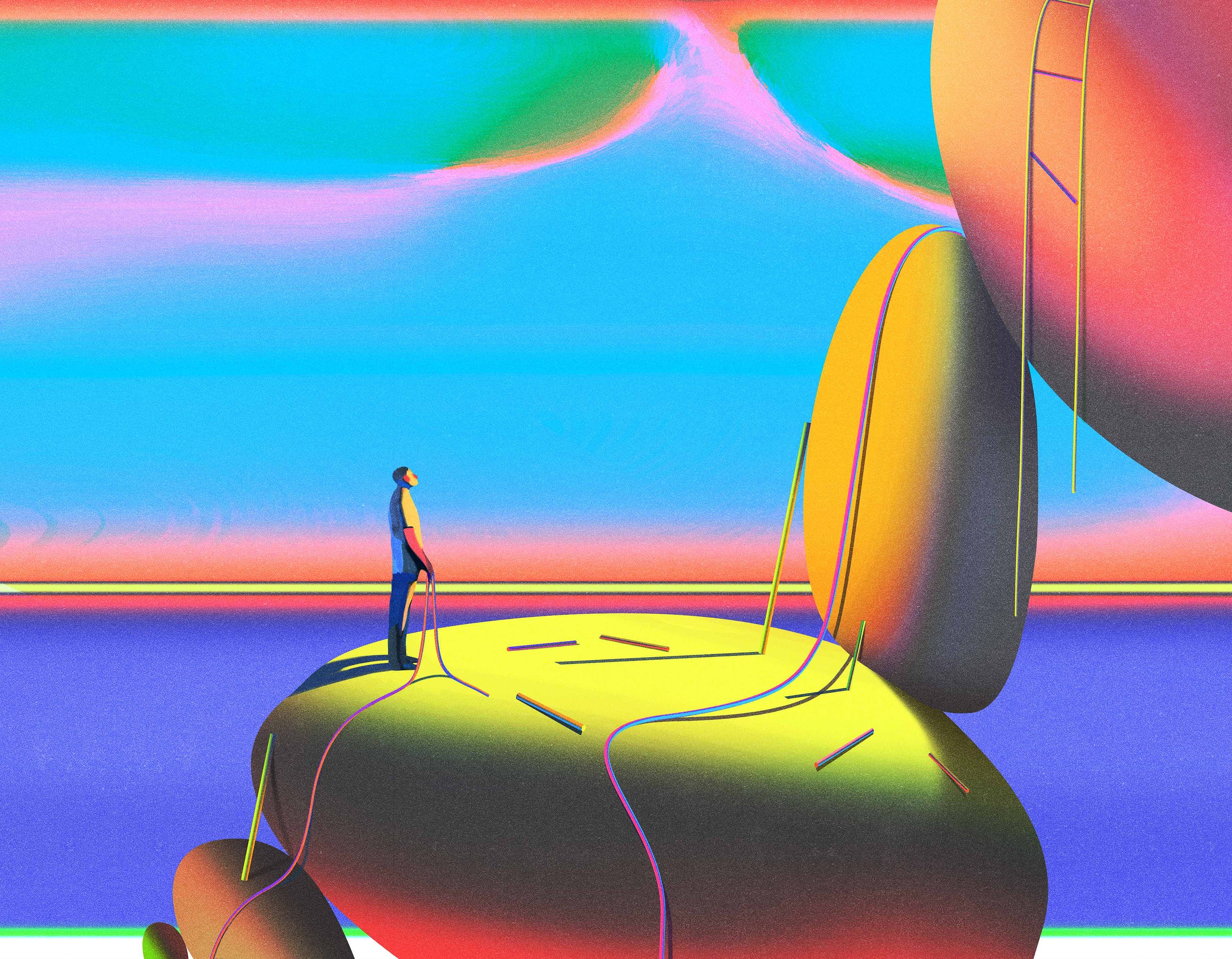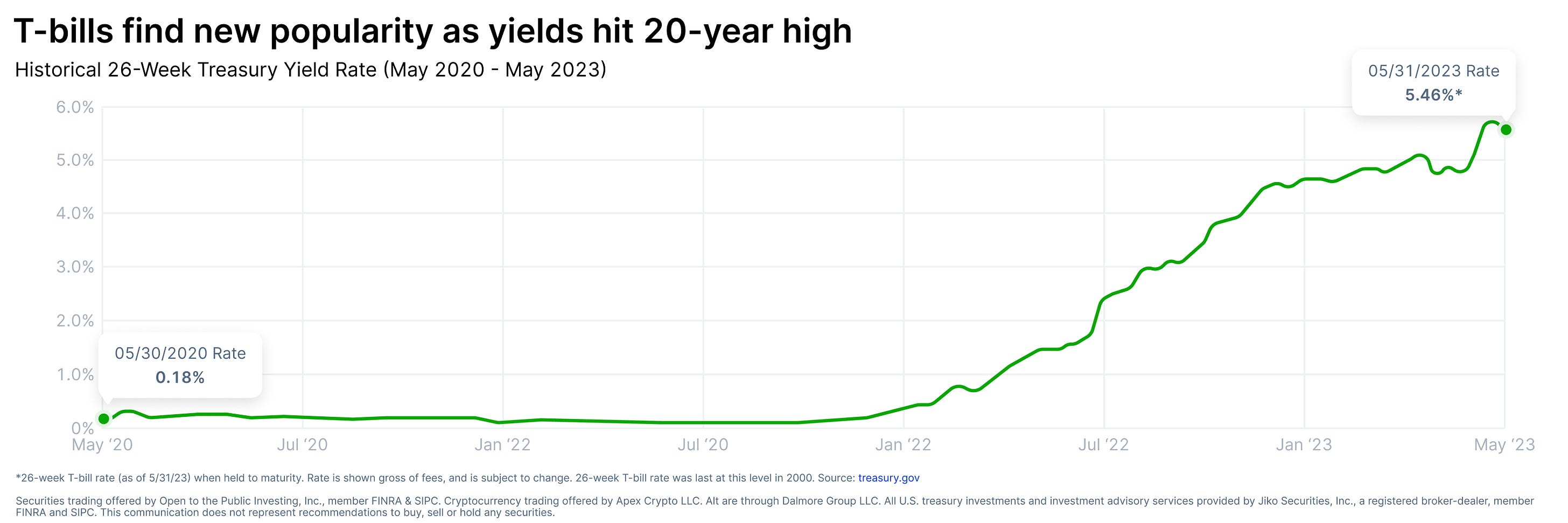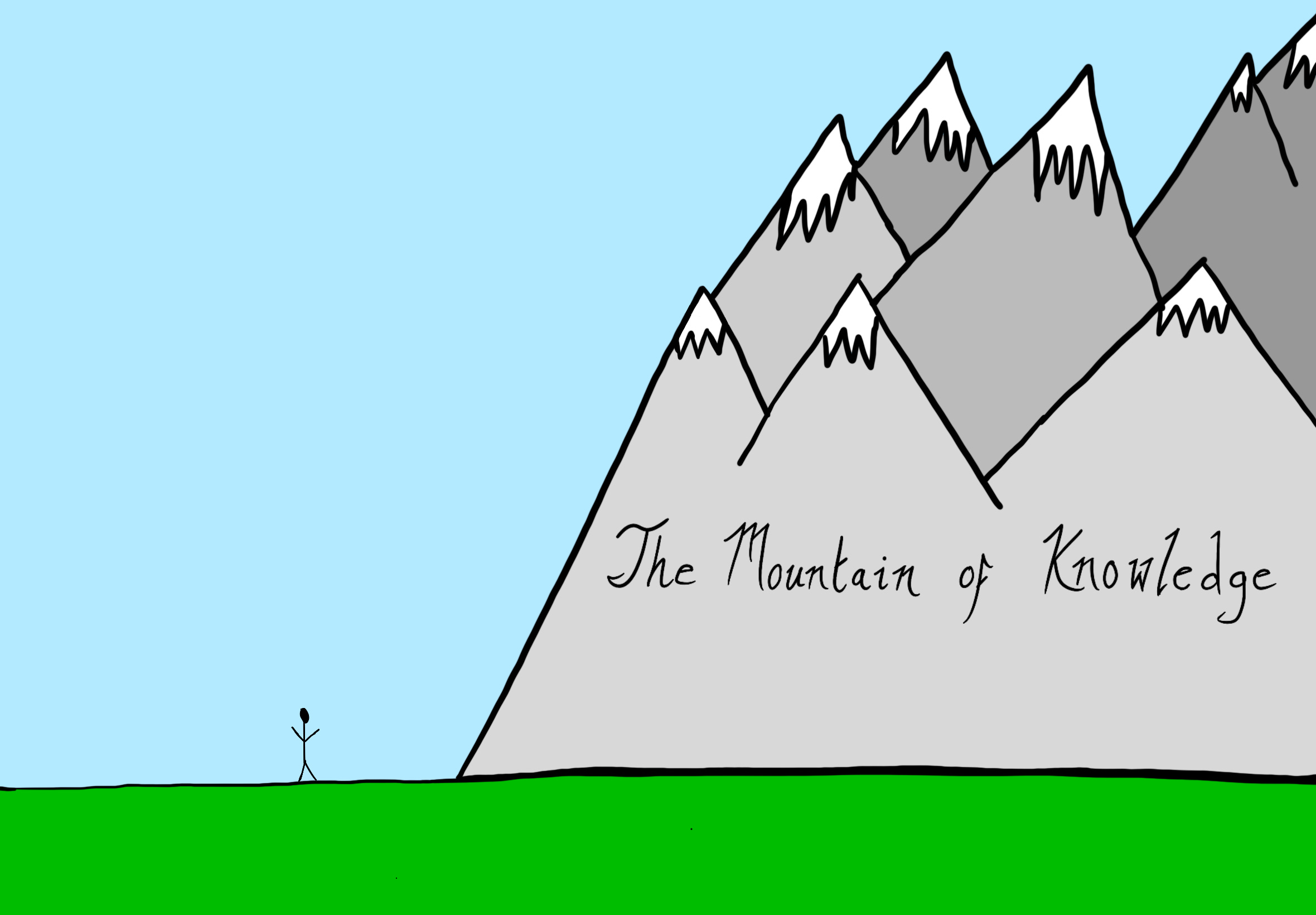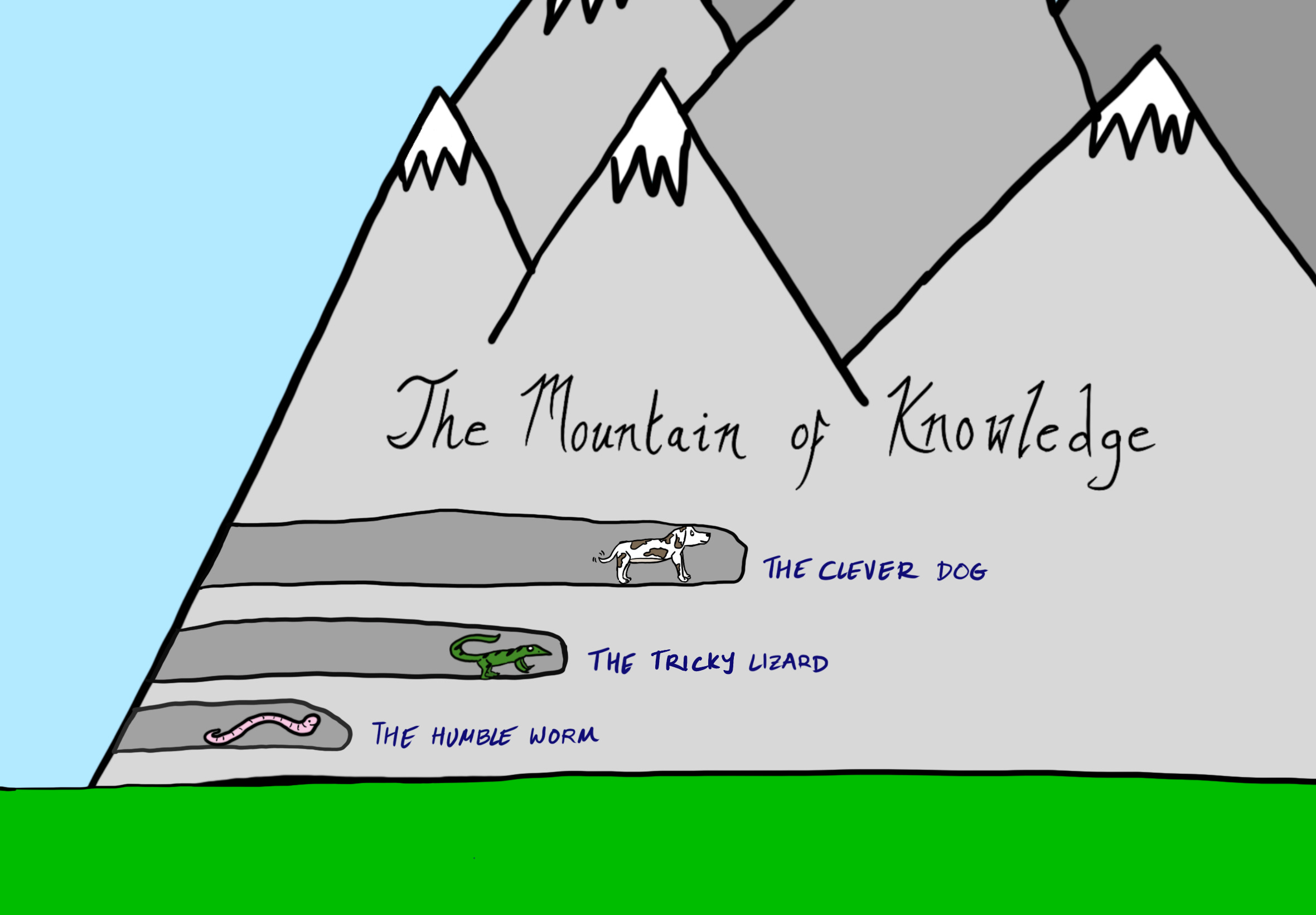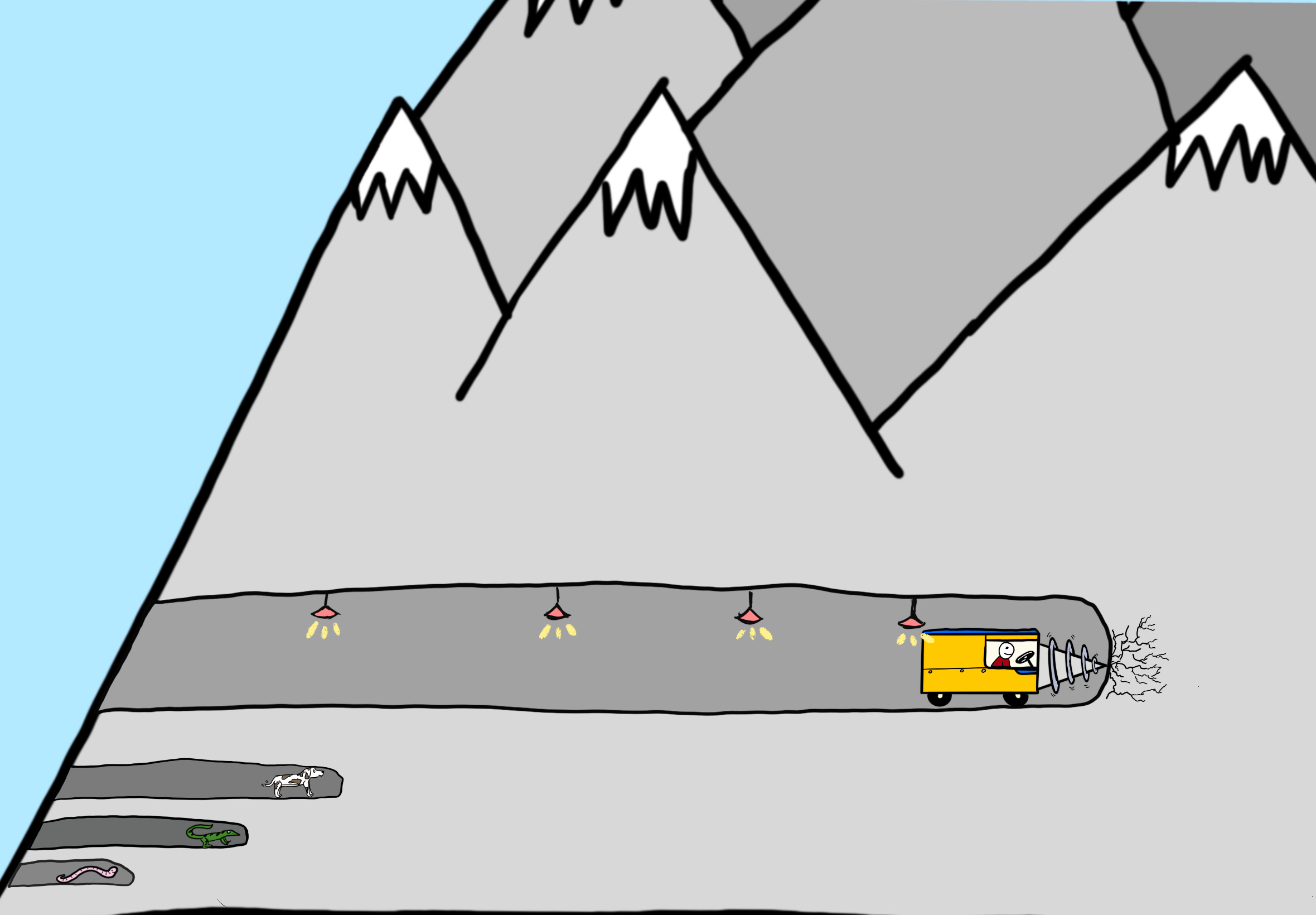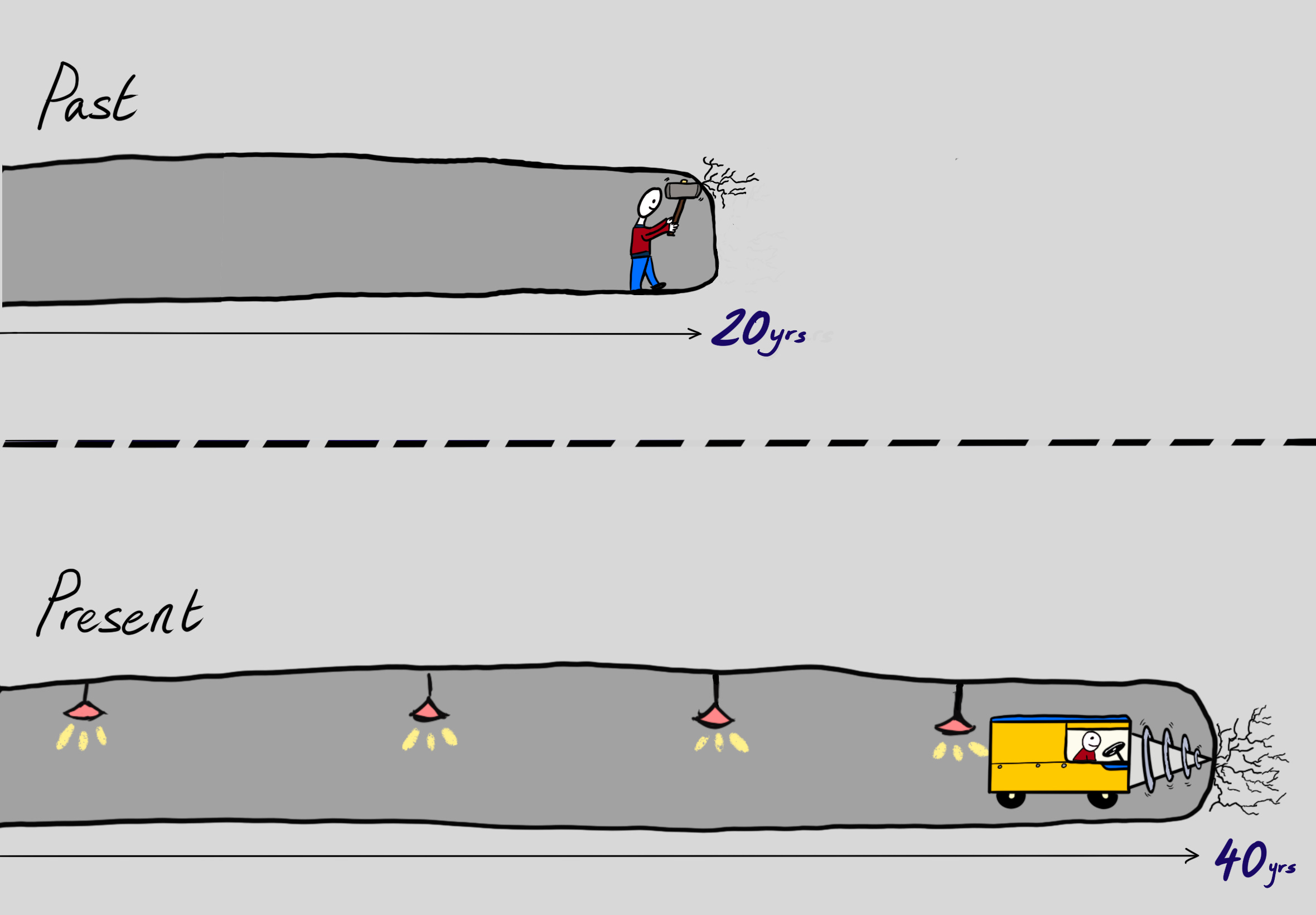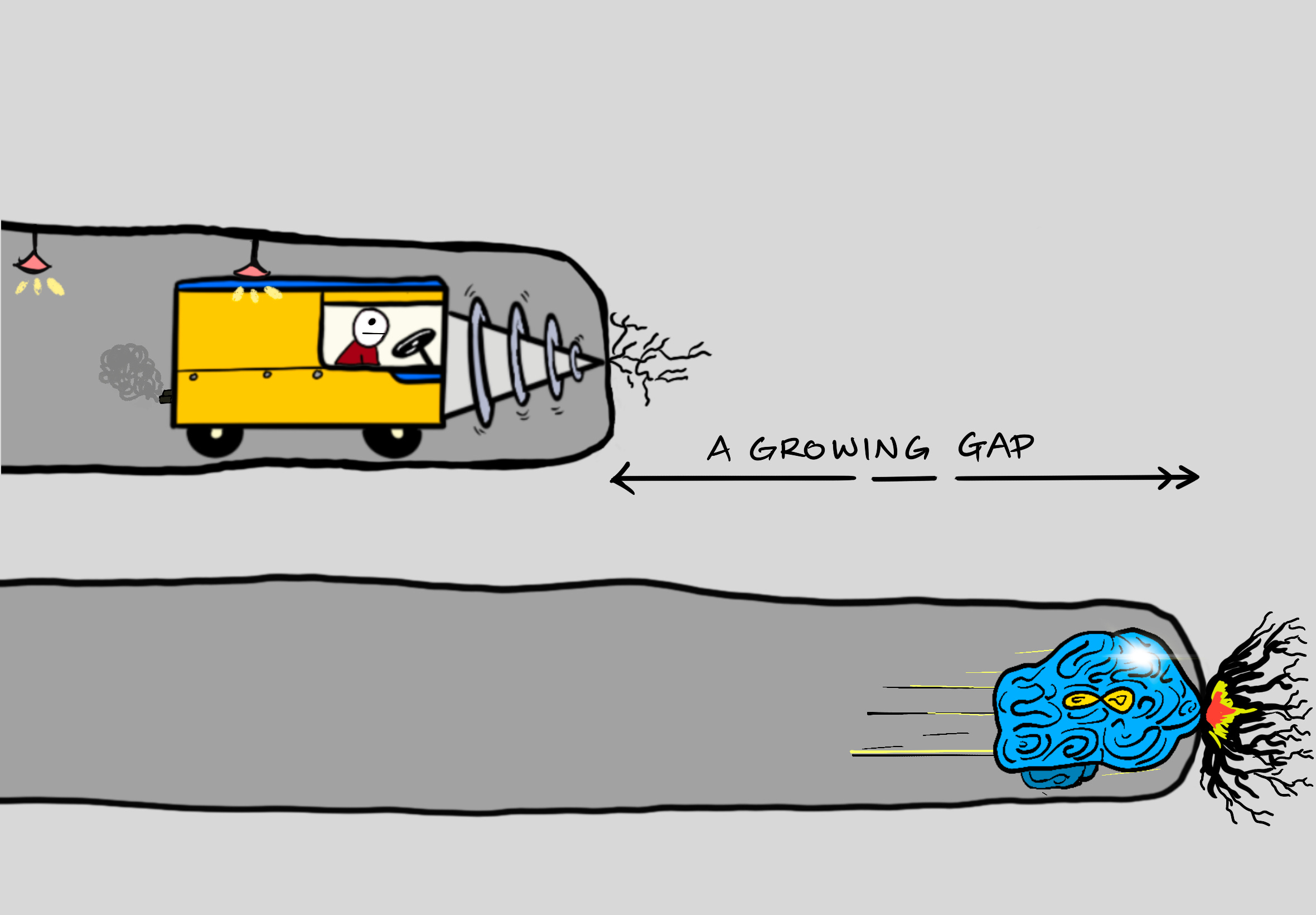The Generalist - AI and The Burden of Knowledge
Friends, Ever since I discovered the concept of the “burden of knowledge,” I can’t stop thinking about it. The idea is this: as humans continue to innovate, they push the frontier of knowledge progressively farther out. Consequently, each successive generation takes longer to reach the frontier, requiring more education and training to get there. As argued by economist Benjamin Jones, this growing “burden” is slowing innovation, as great inventors have less time to innovate. One of the reasons I can’t get this concept off my mind is that it seems a particularly apt framing through which to analyze the disruptive power of artificial intelligence. Though there are innumerable reasons why the breakthroughs of the past 24 months are so startling, one of the most profound may be that AI feels no burden of knowledge. What does that mean for humanity? How will our lives change if we remain on the present trajectory? Today’s piece explores these questions, and the repercussions of Jones’ theory applied to the current moment. A small ask: If you liked this piece, I’d be grateful if you’d consider tapping the ❤️ above! It helps us understand which pieces you like best, and supports our growth. Thank you! Brought to you by PublicLock that rate down. Right now, you can take advantage of some of the highest Treasury yields since the early 2000s on Public. It only takes a few minutes to create your account, purchase government-backed Treasury bills, and start generating a historic 5%+ yield on your cash. Actionable insightsIf you only have a few minutes to spare, here’s what investors, operators, and founders should know about AI and the “burden of knowledge.”
This is a fable about knowledge, how humans acquire it, and why we are outmatched by artificial intelligence – primarily thanks to our annoying tendency to die. Knowledge is a mountain that we are trying to tunnel through. It does not matter that the mountain does not, cannot, end, that we will not break through limestone one day and luxuriate in the sunlight of omniscience. Some believe such things happen in death, but no one expects life to deliver them. Still, we dig. And we are not alone in digging. Every animal, when they are born, starts to dig. It is the process by which living things gain competence and sometimes intelligence. We call this process different things, things like “developing,” “maturing,” and “evolving.” Really, it is just learning, consciously and unconsciously. When a worm hatches from an egg, it must learn to be a worm. When a pup is born, it must learn to be a wolf. A swirl of guppies, released by their mother, must learn to be fish. The act of learning, of digging against the mountain of knowledge, varies by organism and maturity. For most of the animal kingdom, this learning happens in the dark. The roundworm isn’t conscious that it learns to prefer ingesting healthy bacteria and avoiding unhealthy ones, just as a mouse may not realize it is memorizing the paths of a maze. As you scale the cerebral ladder, animals show signs of conscious intelligence. Crows, for example, those black and beady omens, are capable of impressive cognitive feats, such as reasoning by analogy, thinking recursively, and grasping abstract concepts like the number zero. Your shih-tzu, though fond of licking the wall and warring with the Roomba, shows signs of self-awareness. Confronted by the mountain of knowledge, such creatures have found a way to burrow a little deeper. Humans are unique. We are equipped with larger, higher-performance brains and, because of this, find ourselves driven by different ambitions and ideologies, the desire for progress, for example. A scuttering desert lizard does not feel the urge to become better at being. He has no wish to push the frontier of knowledge forward for those who follow. He simply wants to learn how to be a lizard: to snap at flies, lounge against a warm rock, find a mate; in other words, survive, thrive, and procreate. On a generational basis, animals make essentially no progress against the mountain of knowledge – they learn the same biological lessons over and over again. We are not like this. Infected with the drive for knowledge and advancement, humans have a different relationship with the mountain of knowledge. Generation after generation, we tunnel further, learning more. We also tunnel differently: first, we used our hands, then a stick, then a tool, and now we sit on a rumbling chair, directing a vast and spinning drill. The only reason we can tunnel progressively, successively further, is because we have developed a system of knowledge and its acquisition. In fact, we have made many of them. Oral language is one of them, so too, the written word. Schools, universities, teachers, computers, machines – all of these are parts of a vast apparatus designed to equip humanity to chisel against the tunnel’s wall. Not all of us will make it there, of course. Only the gifted, devoted, and adequately trained reach this frontier and have the chance to contribute. The rest of us busy ourselves with ancillary tasks: widening the tunnel’s aperture, supporting its infrastructure, rousing morale among the cooks and builders and teachers and scribes and tradespeople. Over time, humanity’s tunnel through the mountain of knowledge has grown long, and that introduces a problem. It takes an increasing amount of time for a new generation to arrive at its farthest wall, prepared to dig. Three hundred years ago, a ferociously intelligent, well-trained person might be ready to contribute in their twenties, sometimes younger. Isaac Newton began inventing calculus at the age of 23; Gottfried Leibniz, the theorem’s other potential father (even complex math can have a Jerry Springer parentage), was 28 when his work started. (Newton also authored perhaps the clearest description of humanity’s ability to continue tunneling through the mountain of knowledge, “If I have seen farther, it is by standing on the shoulders of giants.”) Despite our technological innovations and improved pedagogies, today’s journey takes considerably longer. The economist Benjamin Jones refers to this malady as “the burden of knowledge.” As we learn more and more, our burden grows; as the tunnel stretches farther and farther, it takes more time to reach its present terminus. Jones documents the result of this: the age at which notable inventions occur is significantly increasing. In 1900, for example, the peak ability to generate a great invention occurred at roughly 30 years old. By 2000, it had risen to nearly 40. Does that matter? As long as we arrive, eventually, isn’t that good enough? Not really – mostly because we have the bad habit of degrading and, eventually, dying. The more time it takes someone to reach the end of the tunnel, the less time they have to actually dig. In particular, they have many fewer “peak” years during which they might make a groundbreaking discovery; longer life expectancies don’t solve this problem since the geriatric do not tend to be a fecund source of innovation. By Jones’ estimation, the growing burden of knowledge has resulted in a 30% decline in “life-cyclical innovation potential.” Less “peak” time at the rockface means that our tunnel is lengthening at a slowing rate. Eventually, a human may spend the entirety of their peak years in the act of travel, arriving in time to give the wall one good whack and then retire. An invasive species has arrived. We would call it “artificial intelligence.” The tunneling humans have many names for it; their scientists dub it the Eternal Encephalon (Aeternum cerebrum). It is an animal of no shape, of many shapes; native to nothing, to ether; to colossal data sets and frenzied silicon chips. We discovered it in the rockface. Over the past seven decades, we have taught it, trained it, played with it, and nurtured it. We have tweaked, twisted, tested, and bred it. We have not always been kind to it. We have called it stupid and pointless and made it watch horrible things so we do not have to. We have set it simple tasks and chuckled at its charming incompetence. We have set impossible tasks and stood slack-jawed at its astonishing precocity. We are proud of it; it frightens us. Every animal has its quirks. Sharks can detect electromagnetic fields. Goats adapt their “accents” to fit in with the herd. When winter falls in Lapland and darkens the landscape, reindeer’s eyes change from a gilded turquoise to a deep, rich cerulean, designed to see better in low light. In the animal kingdom, they alone have the gift of modifying their optical structure. The Encephalon has many such peculiarities but chief among them is the fact that it does not degrade and it does not die. Instead, it simply improves. For most of its life, we have helped it do so – it surpasses us with growing regularity. We taught it our games; it beats us at them. We showed it the architecture of our bodies; it manipulates it better. It does so in strange ways we cannot always follow. It digs differently than we do, and when it arrives at a novel destination, it sometimes seems as if it has relied on magic. Because of these things, some foresee a future in which the Encephalon does not need humans at all. (Others laugh at the idea of a tool turning master: do you fear the drill will overtake us, too? Will we live beneath the rule of a thinking hammer?) It is a thought that frightens, not least because of the Encephalon’s relationship with the burden of knowledge, which is that it does not feel it. Because it does not die, there is no lag in reaching the rockface. Because it does not degrade, its digging does not slow. As our efforts decelerate, the Encephalon’s accelerate, and when it no longer needs us, it will be fully loosed in the mountain of knowledge, speeding ahead, leaving an ever-expanding gap between us and it. There are many things that could happen in this world, including many bad ones, and they are not difficult to imagine. There are also good ones that might feel bad. For instance: some things cannot be explained to an animal. No matter how complete your methodology or rigorous your training, you will not succeed in teaching a toad Archimedes’ principle, even as he plops into the water. In computing terms, these creatures are hardware-constrained, limited by their processing power. The Encephalon puts us in a similar position. We may become secondary creatures, incapable of understanding the world we live in, even as we reap its benefits. In such a configuration, we are the happy, wall-licking shih-tzu benefiting from central heating, ready food, and mesmerizing toys without grasping how they have arrived. One of the implicit agreements a society makes is that no one needs to know everything. We consult the doctor to treat our ailments, even if we have a limited understanding of our biological processes. We hire a contractor to mend our roof, though we grasp neither gable nor fascia. At some level, we agree to trust one another. Though we do not individually know everything today, we live in the certainty that everything is known by someone, that it is, in some respect, knowable. Living in a society organized by a higher intelligence strains trust past its breaking point, pushing us into a world where we live by faith. As Eric Schmidt, Henry Kissinger, and Daniel Huttelocher ask in their book on artificial intelligence: “If we are unable to fathom the logic of each individual decision, should we implement its recommendations on faith alone?” What is it, even, that we mean by faith? For most, that term is freight by traditional religious connotations that depict gods as human-like and, primarily, benevolent. There is little reason to believe an invented god, a synthetic super-intelligence, would adhere to such traditions. In his landmark essay, “What Is It Like to Be a Bat?” philosopher Thomas Nagel argues that grasping another conscious animal’s sense of being is fundamentally impossible. “If there is conscious life elsewhere in the universe,” he writes, “it is likely that some of it will not be describable even in the most general experiential terms available to us.” The coming gods will be less scrutable, less predictable, than our conventional numina. What are we to do? Can humans hope to maintain primacy as the mountain’s most knowledgeable species? There are no good answers – the clearest ideas come from dystopian fiction or billionaires’ gambits. Returning to a computing framework, humans have several deficiencies compared to a future-stage Eternal Encephalon. We are certainly less durable, which is perhaps why so much Silicon Valley capital flows into longevity research. If we could just live forever – replacing atrophying hearts with facsimiles, reversing cellular, jellying our brains in jars; pick your nightmare – if we could extend our peak indefinitely, we might have a chance of keeping the Encephalon within eyesight. Durability is the greatest discrepancy now, but it will not be for long. Soon, we will be less capable, too. For a time, the wonders the Encephalon reveals could accelerate our learning, our tunneling; but without ancillary support, we will be outmatched. So enter the likes of Neuralink. Such brain-computer interface makers dream that they will not only resolve deficiencies but reduce lag and unleash new brilliance. With their aid, we may be able to shorten the time it takes to reach the rockface: downloading Newton’s calculus into the minds of toddlers and introducing alien cognition into our human brain. Such synthesis would mark the beginning of a new species, a different animal, but one, at least, with a human embodiment. “Fable” is an interesting, intricate word. As a noun, it is a story, usually involving animals, dictating a lesson. In this restful state of being and being named, it is a sort of supra-truth operating at a sufficient distance to depict reality. As a verb, it springs into skulking, conniving life. It means to lie. To speak falsely. I am not sure which this fable will turn out to be. It does not matter; we are humans, we will keep digging. Puzzler
Winners of last week’s puzzler included Shashwat N, Timothy B, John G, Alex F, Kelly O, Michael O, and Morihiko Y. Well played to all for providing clever responses to this riddle:
The answer? A feather or balloon. Until next time, Mario |
Older messages
Modern Meditations: Scott Belsky
Tuesday, June 20, 2023
The Adobe CPO on innovating from within, shipping slow, and AI.
Intercom’s AI Evolution
Sunday, May 21, 2023
An interview with co-founder and Chief Strategy Officer, Des Traynor.
Watershed: A Climate Pragmatist
Sunday, May 14, 2023
The $1 billion carbon accounting platform has attracted investment from Sequoia and Kleiner Perkins. Its greatest strength is its practical, market-driven approach to the climate crisis.
How Vanta Grew Through the Downturn
Friday, May 12, 2023
The trust management platform has used a venture capital winter to extend its lead.
Where Do Great Ideas Come From?
Monday, May 8, 2023
Seven research studies reveal the people, incentives, and environments that create innovation.
You Might Also Like
🚀 Ready to scale? Apply now for the TinySeed SaaS Accelerator
Friday, February 14, 2025
What could $120K+ in funding do for your business?
📂 How to find a technical cofounder
Friday, February 14, 2025
If you're a marketer looking to become a founder, this newsletter is for you. Starting a startup alone is hard. Very hard. Even as someone who learned to code, I still believe that the
AI Impact Curves
Friday, February 14, 2025
Tomasz Tunguz Venture Capitalist If you were forwarded this newsletter, and you'd like to receive it in the future, subscribe here. AI Impact Curves What is the impact of AI across different
15 Silicon Valley Startups Raised $302 Million - Week of February 10, 2025
Friday, February 14, 2025
💕 AI's Power Couple 💰 How Stablecoins Could Drive the Dollar 🚚 USPS Halts China Inbound Packages for 12 Hours 💲 No One Knows How to Price AI Tools 💰 Blackrock & G42 on Financing AI
The Rewrite and Hybrid Favoritism 🤫
Friday, February 14, 2025
Dogs, Yay. Humans, Nay͏ ͏ ͏ ͏ ͏ ͏ ͏ ͏ ͏ ͏ ͏ ͏ ͏ ͏ ͏ ͏ ͏ ͏ ͏ ͏ ͏ ͏ ͏ ͏ ͏ ͏ ͏ ͏ ͏ ͏ ͏ ͏ ͏ ͏ ͏ ͏ ͏ ͏ ͏ ͏ ͏ ͏ ͏ ͏ ͏ ͏ ͏ ͏ ͏ ͏ ͏ ͏ ͏ ͏ ͏ ͏ ͏ ͏ ͏ ͏
🦄 AI product creation marketplace
Friday, February 14, 2025
Arcade is an AI-powered platform and marketplace that lets you design and create custom products, like jewelry.
Crazy week
Friday, February 14, 2025
Crazy week. ͏ ͏ ͏ ͏ ͏ ͏ ͏ ͏ ͏ ͏ ͏ ͏ ͏ ͏ ͏ ͏ ͏ ͏ ͏ ͏ ͏ ͏ ͏ ͏ ͏ ͏ ͏ ͏ ͏ ͏ ͏ ͏ ͏ ͏ ͏ ͏ ͏ ͏ ͏ ͏ ͏ ͏ ͏ ͏ ͏ ͏ ͏ ͏ ͏ ͏ ͏ ͏ ͏ ͏ ͏ ͏ ͏ ͏ ͏ ͏ ͏ ͏ ͏ ͏ ͏ ͏ ͏ ͏ ͏ ͏ ͏ ͏ ͏ ͏ ͏ ͏ ͏ ͏ ͏ ͏ ͏ ͏ ͏ ͏ ͏ ͏ ͏ ͏ ͏ ͏ ͏ ͏ ͏ ͏ ͏
join me: 6 trends shaping the AI landscape in 2025
Friday, February 14, 2025
this is tomorrow Hi there, Isabelle here, Senior Editor & Analyst at CB Insights. Tomorrow, I'll be breaking down the biggest shifts in AI – from the M&A surge to the deals fueling the
Six Startups to Watch
Friday, February 14, 2025
AI wrappers, DNA sequencing, fintech super-apps, and more. ͏ ͏ ͏ ͏ ͏ ͏ ͏ ͏ ͏ ͏ ͏ ͏ ͏ ͏ ͏ ͏ ͏ ͏ ͏ ͏ ͏ ͏ ͏ ͏ ͏ ͏ ͏ ͏ ͏ ͏ ͏ ͏ ͏ ͏ ͏ ͏ ͏ ͏ ͏ ͏ ͏ ͏ ͏ ͏ ͏ ͏ ͏ ͏ ͏ ͏ ͏ ͏ ͏ ͏ ͏ ͏ ͏ ͏ ͏ ͏ ͏ ͏ ͏ ͏ ͏ ͏ ͏ ͏ ͏ ͏ ͏
How Will AI-Native Games Work? Well, Now We Know.
Friday, February 14, 2025
A Deep Dive Into Simcluster ͏ ͏ ͏ ͏ ͏ ͏ ͏ ͏ ͏ ͏ ͏ ͏ ͏ ͏ ͏ ͏ ͏ ͏ ͏ ͏ ͏ ͏ ͏ ͏ ͏ ͏ ͏ ͏ ͏ ͏ ͏ ͏ ͏ ͏ ͏ ͏ ͏ ͏ ͏ ͏ ͏ ͏ ͏ ͏ ͏ ͏ ͏ ͏ ͏ ͏ ͏ ͏ ͏ ͏ ͏ ͏ ͏ ͏ ͏ ͏ ͏ ͏ ͏ ͏ ͏ ͏ ͏ ͏ ͏ ͏ ͏ ͏ ͏ ͏ ͏ ͏ ͏ ͏ ͏ ͏ ͏ ͏ ͏ ͏ ͏ ͏ ͏
